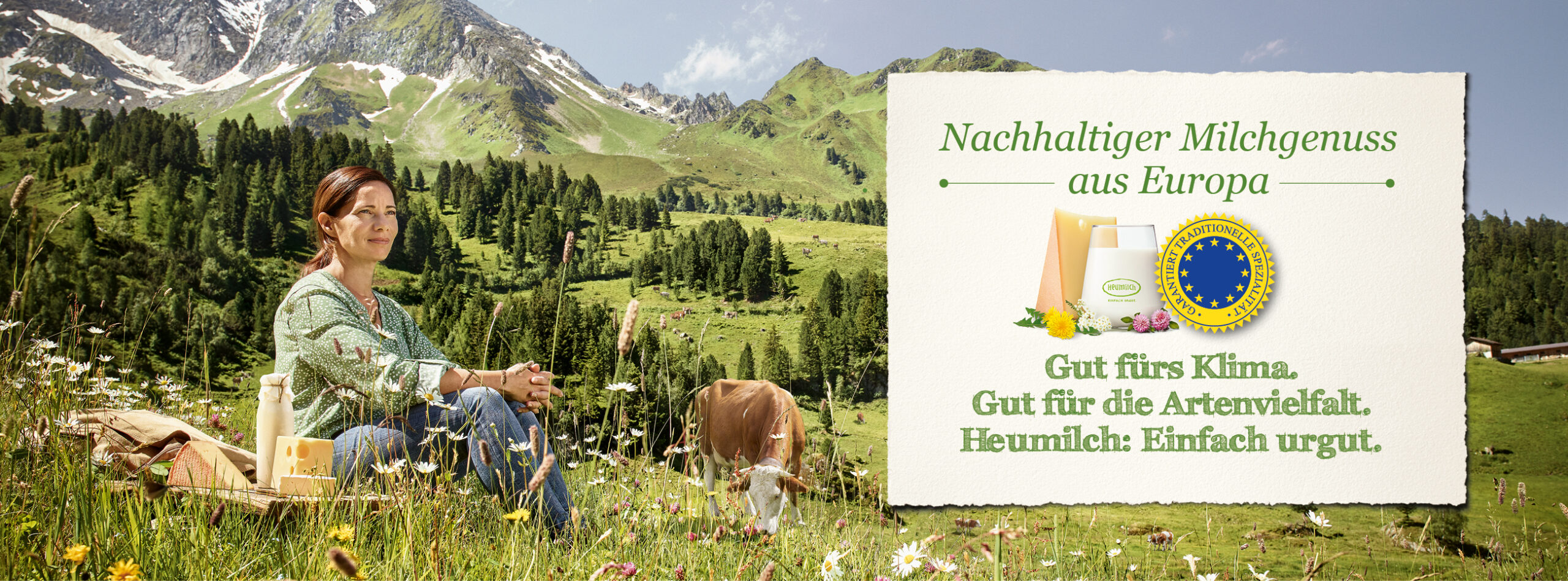“Good for biodiversity, good for the climate: hay milk, simply good”: promoting the environmental sustainability of mountain foods
Mountain products are generally considered by consumers to be very tasty, but the general public is not necessarily aware of their sustainability. Yet, mountain farming provides many ecosystem services, including for protection of biodiversity. Austrian and German hay milk producers decided to promote the sustainability of haymilk through a communication campaign funded by the European agrifood promotion calls.
Hay milk: a sustainable production
Hay milk is a traditional way of producing milk, particularly in mountainous areas. The animals are fed on grass in summer and hay in winter, with a ban on silage and genetically modified feed. This practice is considered particularly sustainable, especially with regard to biodiversity, landscape protection and animal welfare.
The Austrian Association of Hay-Milk Producers has documented how this production method contributes to achieving many of the Sustainable Development Goals. By contributing to the storage of CO2 in permanent mountain grasslands, livestock farming contributes to SDG 13 on climate action. Mosaic grasslands and the limited use of concentrated feed also contribute to SDG 12 on responsible consumption and production. Moreover, the sector also helps to maintain employment and dynamism in mountain regions, thus contributing to SDG 8 for decent work and economic growth.
Targeted communication to raise consumer awareness
To encourage more sustainable consumption, the Austrian Association of Hay Milk Producers, together with its German counterpart, is running a campaign to promote the product. The campaign aims to raise awareness of hay-milk in German regions where hay-milk is less well known to consumers. While in Austria hay-milk represents 6,000 farmers and 15% of the volume of milk produced, in Germany it represents 500 farmers and 1% of the volume. The German regions targeted by this communication campaign include southern regions, which are cross-border with Austria and mainly mountainous, such as Bavaria and Baden-Württemberg, but also major economic areas such as Berlin, Hamburg or North Rhine-Westphalia.
To achieve this, the campaign implements the following actions:
- Setting up a “rustic alpine kitchen” 40 times a year in the most frequented supermarkets to communicate with consumers. The various hay-milk products, in particular cheeses, are cooked live and offered to consumers.
- Participating in 9 food fairs per year.
- Organising an annual study visit to hay-milk production areas with retail staff to raise awareness of production methods.
- Communicating to consumers through leaflets, social media, press conferences and advertisements on TV or in train stations.
With these actions, the campaign aims, among others, to raise awareness about hay-milk among German consumers by 5%, and to increase knowledge and understanding of the Traditional Speciality Guaranteed label associated with hay-milk production by 5%.
Furthermore, in a context where consumers are increasingly favouring sustainable products, the aim is to increase the perception of hay-milk as a sustainable product by 10%. Interestingly, the campaign initially focused on the contribution of hay-milk production to the protection of permanent grassland biodiversity. However, by the time the project started, consumer attention had shifted to climate action. The producer organisations therefore adapted their campaign to include this element, highlighting in particular the benefits in terms of carbon sequestration.
